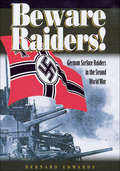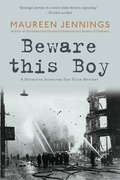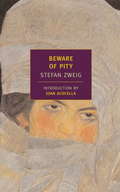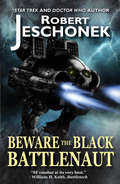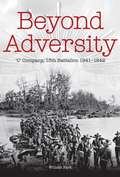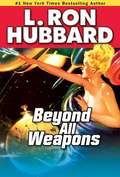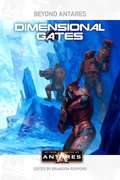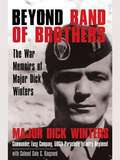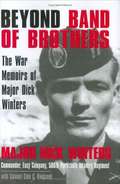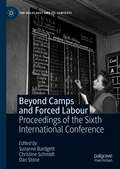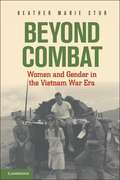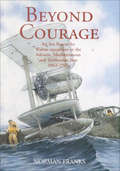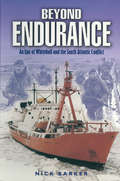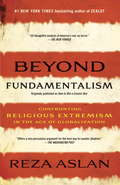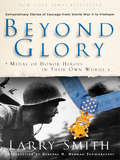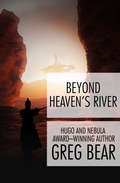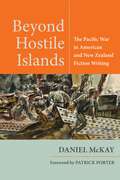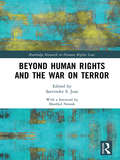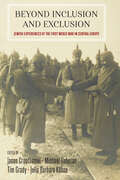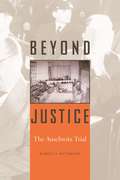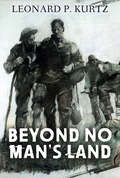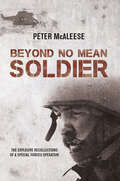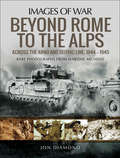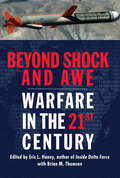- Table View
- List View
Beware Raiders!: German Surface Raiders in the Second World War
by Bernard EdwardsA British naval historian recounts the victories and defeats of two of the most infamous German Navy vessels during World War II. Bernard Edwards&’s Beware Raiders! tells the fascinating story of two German ships and the havoc they caused amongst Allied shipping in World War II. One was the eight-inch gun cruiser Admiral Hipper—named for World War I&’s German fleet Admiral Franz von Hipper—fast, powerful, and Navy-manned. The other was a converted merchant man, Hansa Line&’s Kandelfels armed with a few old scavenged guns manned largely by reservists, and sailing under the nom de guerre Pinguin. The difference between the pride of the Third Reich&’s Kriegsmarine&’s fleet and the converted cruiser was even more evident in their commanders. Edwards emphasizes the striking contrast between the conduct of Ernst Kruder, captain of the Pinguin, who attempted to cause as little loss of life as possible, and the callous Iron Cross–decorated Wilhelm Meisel of the Admiral Hipper, who had scant regard for the lives of the men whose ships he had sunk. Contrary to all expectations, as Edwards reveals in his thrilling accounts of the missions performed by each ship, the amateur man-of-war reaped a rich harvest and went out in a blaze of glory. The purpose-built battlecruiser, on the other hand, was hard-pressed even to make her mark on the war and ended her days in ignominy.
Beware This Boy
by Maureen JenningsNovember, 1940. Tom Tyler, Detective Inspector of the small Shropshire town of Whitchurch, is a troubled man. The preceding summer had been a dark one for Britain, and even darker for Tom's own family and personal life. So he jumps at the opportunity to help out in the nearby city of Birmingham, where an explosion in a munitions factory has killed or badly injured several of the young women who have taken on dangerous work in support of the war effort.At first, it seems more than likely the explosion was an accident, and Tom has only been called in because the forces are stretched thin. But as he talks to the employees of the factory, inner divisions -- between the owner and his employees, between unionists and workers who fear communist infiltration -- begin to appear. Put that together with an AWOL young soldier who unwittingly puts all those he loves at risk and a charming American documentary filmmaker who may be much more than he seems, and you have a page-turning novel that bears all the hallmarks of Maureen Jennings' extraordinary talent: a multi-faceted mystery, vivid characters, snappy dialogue, and a pitch-perfect sense of the era of the Blitz, when the English were pushed to their limits and responded with a courage and resilience that still inspires.
Beware of Pity
by Stefan Zweig Trevor Blewitt Joan Accocella Phyllis BlewittThe great Austrian writer Stefan Zweig was a master anatomist of the deceitful heart, and Beware of Pity, the only novel he published during his lifetime, uncovers the seed of selfishness within even the finest of feelings.Hofmiller, an Austro-Hungarian cavalry officer stationed at the edge of the empire, is invited to a party at the home of a rich local landowner, a world away from the dreary routine of the barracks. The surroundings are glamorous, wine flows freely, and the exhilarated young Hofmiller asks his host--s lovely daughter for a dance, only to discover that sickness has left her painfully crippled. It is a minor blunder that will destroy his life, as pity and guilt gradually implicate him in a well-meaning but tragically wrongheaded plot to restore the unhappy invalid to health.
Beware the Black Battlenaut
by Robert T. Jeschonek Ben BaldwinAll-out war engulfs a distant quadrant of space. Hardcore warriors clash in high tech Battlenaut armor, pitting the ultimate fighting machines in epic struggles on a planetary scale. In the heart of this raging hell, the sleep-deprived Redeye squad fights harder than anyone. Pumped up on drugs, wired to the max, the Redeyes tear through enemy forces like berserk Vikings. But fatigue takes a toll, as the Redeyes start to see things that don't exist. And something that might exist after all--a terrible harbinger of doom, a legendary herald of the end of all things. Does the Black Battlenaut truly tower over the blood-soaked war zone? Is it a nightmare brought on by exhaustion, or an omen of infinite devastation? Either way, the Redeyes set out to stop it by any means necessary...even if their private war requires the ultimate sacrifice and more. Don't miss this exciting tale by award-winning storyteller Robert T. Jeschonek, a master of hard-hitting science fiction that really packs a punch."Robert Jeschonek is a towering talent..." - Mike Resnick, Hugo and Nebula Award-winning author of the Starship series.
Beyond Adversity: U' Company, 15th Battalion 1941-1942 (Big Sky Publishing Ser.)
by William ParkIn November 1941, about 100 university students began their short-term compulsory military training with the 15th Infantry Battalion. Most were aged 19-22, had daytime jobs and were evening or external students from the arts, commerce and law faculties. They were ambitious, hard-working young men anxious to make their way in the world. Their compulsory military training was due to end on 4 February 1942 and the students would then be released to return to their jobs and continue their part-time studies. The outbreak of the Pacific War on 7 December changed everything. In April 1942, the 15th Battalion was given 24 hours' notice to move from Caloundra to Townsville. In January 1943 the Battalion went to New Guinea to take part in the Salamaua and Lae campaigns and did not return to Brisbane until July 1944. In November it was sent to fight in Bougainville. The Battalion finally returned home in January 1946 and most returned to resume their studies and jobs within the community. This book tells the story of those Queensland University students of `U' Company, 15th Battalion during its brief existence. It covers their wartime service in all its tragedy and triumph and how they resumed their lives, studies and careers once the war was over. Most regard themselves as being very fortunate - to have survived the war, to have learned to cope with adversity, to have learned the importance of getting on with life in spite of insurmountable obstacles and in having been able to make the most of opportunities that arose. They have been fortunate to find a life beyond adversity.
Beyond All Weapons
by L. Ron HubbardBoldly go to new worlds. Firstin Guide is not a man to be reckoned with. Bilged out of the Space Academy at fourteen for one too many duels, raised in the lawless camps of Mars' southern ice cap and cast aside by his family, Firstin's experiences have made him resourceful, respected and feared. But it's just that brute strength of character which convinces a handful of Martian colonists to follow him as he leads a risky venture into space, escaping the tyrannical Earth government that has all but slaughtered them.The small band secures a spaceship that uses an innovative new fuel and, by the grace of the stars, finds a liveable planet. But the men of the new colony led by Firsten also thirst for revenge which drives them to return to Earth and exact retribution despite dire warnings against it. ALSO INCLUDES THE SCIENCE FICTION STORIES "STRAIN" AND "THE INVADERS" "...sci-fi stories from L. Ron Hubbard. Innocent & enjoyable vintage romps." --Review DuJour (Jeff Berkwits, Twitter review)
Beyond Antares: Dimensional Gates
by Brandon Rospond Robert E. WatersAn anthology of 10 stories set in the Gates of Antares Universe
Beyond Band of Brothers: The War Memoirs Of Major Dick Winters (Thorndike Paperback Bestsellers Ser.)
by Dick Winters Cole C. KingseedThey were called Easy Company--but their mission was never easy. Immortalized as the Band of Brothers, they suffered 150% casualties while liberating Europe--an unparalleled record of bravery under fire. Dick Winters was their commander--"the best combat leader in World War II" to his men. This is his story--told in his own words for the first time. On D-Day, Dick Winters parachuted into France and assumed leadership of the Band of Brothers when their commander was killed. He led them through the Battle of the Bulge and into Germany, by which time each member had been wounded. They liberated an S.S. death camp from the horrors of the Holocaust and captured Berchtesgaden, Hitler's alpine retreat. After briefly serving during the Korean War, Winters was a highly successful businessman. Made famous by Stephen Ambrose's book Band of Brothers--and the subsequent award-winning HBO miniseries--he is the object of worldwide adulation. Beyond Band of Brothers is Winters's memoir--based on his wartime diary--but it also includes his comrades' untold stories. Virtually all this material is being released for the first time. Only Winters was present from the activation of Easy Company until the war's end. Winner of the Distinguished Service Cross, only he could pen this moving tribute to the human spirit.
Beyond Band of Brothers: The War Memoirs of Major Dick Winters
by Dick WintersOn D-Day, Winters parachuted into France and assumed leadership of the Band of Brothers. Here are his and their stories from WWII.
Beyond Camps and Forced Labour: Proceedings of the Sixth International Conference (The Holocaust and its Contexts)
by Christine Schmidt Dan Stone Suzanne BardgettThis book presents a selection of the newest research on themes amplified by the sixth annual Beyond Camps and Forced Labour conference on the post-Holocaust period, including ‘displaced persons’, reception and resettlement, exiles and refugees, trials and justice, reparation and restitution, and memory and testimony. The chapters highlight new, transnational approaches and findings based on underused and newly opened archives, including compensation files of the British government; on historical actors often on the periphery within English-language historiography, including Romanian and Hungarian survivors; and new approaches such as the spatial history of Drancy, as well as geographies that have undergone less scrutiny, for example, Tehran, Chile, Mexico and Cyprus. This volume represents the vibrant and varied state of research on the aftermath of the Holocaust.
Beyond Combat: Women and Gender in the Vietnam War Era
by Heather Marie SturBeyond Combat investigates how the Vietnam War both reinforced and challenged the gender roles that were key components of American Cold War ideology. Refocusing attention onto women and gender paints a more complex and accurate picture of the war's far-reaching impact beyond the battlefields. Encounters between Americans and Vietnamese were shaped by a cluster of intertwined images used to make sense of and justify American intervention and use of force in Vietnam. These images included the girl next door, a wholesome reminder of why the United States was committed to defeating Communism, and the treacherous and mysterious 'dragon lady', who served as a metaphor for Vietnamese women and South Vietnam. Heather Stur also examines the ways in which ideas about masculinity shaped the American GI experience in Vietnam and, ultimately, how some American men and women returned from Vietnam to challenge homefront gender norms.
Beyond Courage: Air Sea Rescue by Walrus Squadrons in the Adriatic, Mediterranean and Tyrrhenian Seas 1942–1945
by Norman FranksThe author of Another Kind of Courage takes a deep dive into the World War II heroics of the pilots and aircrew of the single-engined amphibian airplanes. This book covers the adventures of 283, 284, 293 and 294 Walrus Squadrons, operating from North Africa, Sicily, Italy and Sardinia. The pilots, like their counterparts in England, knew of the dangers of landing on the sea. It was a daunting task attempting to rescue downed airmen as they had often to operate in bad weather, and near hostile coasts. Airmen who were bobbing about in dinghies, or even just in their Mae West life jackets, were difficult to locate. Rescues from the cold sea needed to be speedy affairs, especially of those survivors not in dinghies, and the Walrus aircrew were always aware that time was of the essence. Moreover, rescues near a hostile shore often resulted in gunfire from German or Italian gunners. Many Walrus pilots have added personal recollections to the narrative and so too have some of those airmen who were rescued. As well as RAF and SAAF airmen, there were numerous USAAF units involved in the air war over the Mediterranean and Italy, and Norman has been in contact with several Americans whose lives were saved by these gallant men who flew the Walrus amphibian single-engined biplane. Men who knew only too well that to pick up more than two or three airmen generally meant a hard sea-borne taxi ride back to base, which conditions never guaranteed. The stories of these rescues give one a sense of sincere pride in the men who daily risked their lives to save others from a very hostile environment.
Beyond Endurance: An Epic of Whitehall and the South Atlantic Conflict (Post World War Ll Ser.)
by Nick BarkerAn Epic of Whitehall and the South Atlantic Conflict. This is the story of HMS Endurance before, during and after the Falklands conflict.
Beyond Fundamentalism: Confronting Religious Extremism in the Age of Globalization
by Reza AslanThe wars in the Middle East have become religious wars in which God is believed to be directly engaged on behalf of one side against the other. The hijackers who attacked America on September 11, 2001, thought they were fighting in the name of God. According to award-winning writer and scholar of religions Reza Aslan, the United States, by infusing the War on Terror with its own religiously polarizing rhetoric, is fighting a similar war-a war that can't be won. Beyond Fundamentalism is both an in-depth study of the ideology fueling al-Qa'ida, the Taliban, and like-minded militants throughout the Muslim world and an exploration of religious violence in Judaism, Christianity, and Islam. At a time when religion and politics increasingly share the same vocabulary and function in the same sphere, Aslan writes that we must strip the conflicts of our world of their religious connotations and address the earthly grievances that always lie at its root. How do you win a religious war? By refusing to fight in one. Featuring new content and updated analysis. Originally published as How to Win a Cosmic War.
Beyond Glory: Medal of Honor Heroes in Their Own Words
by Larry Smith Eddie Adams H. Norman SchwarzkopfThis first oral history of living Medal of Honor winners evokes Flags of Our Fathers with stirring accounts of patriotic valor. This New York Times best-selling account of battlefield courage celebrates the larger-than-life sacrifices of those awarded the nation's highest honor for valor in combat. Exclusive interviews with these twenty-four men--firsthand accounts of battlefield sacrifice from the greatest generation to Vietnam, along with before-and-after stories--form the core of this classic work. The recipients, as portrayed here, represent a cross-section as diverse as America itself--officers and enlisted men; African Americans, Hispanics, and Caucasians; men who went on to become famous (Daniel Inouye, James Stockdale, Bob Kerrey) and others who returned proudly to small towns. Beyond Glory, in the voices of these heroes, is a testament to the courage of the American nation.
Beyond Heaven's River
by Greg BearA Japanese WWII soldier finds himself on an alien world in this novel from the bestselling &“master of the grand-scale SF novel&” (Booklist). Yoshio Kawashita is a great warrior until aliens whisk him away during World War II. They put him on a desolate planet far from his home, where he is destined to remain forever, leaving him alone in his new hell. Then Anna Nestor appears. This empress does not see planets as homes for their inhabitants; she sees exploitable real estate. Anna Nestor views Kawashita as a sideshow attraction until they fall in love. But the two lovebirds cannot be free until they find out who kidnapped Kawashita and why.
Beyond Hostile Islands: The Pacific War in American and New Zealand Fiction Writing (World War II: The Global, Human, and Ethical Dimension)
by Daniel McKayWINNER, JAVIER COY BIENNIAL RESEARCH AWARD, BEST MONOGRAPHOffers a fascinating window into how the fraught politics of apology in the East Asian region have been figured in anglophone literary fiction.The Pacific War, 1941-1945, was fought across the world’s largest ocean and left a lasting imprint on anglophone literary history. However, studies of that imprint or of individual authors have focused on American literature without drawing connections to parallel traditions elsewhere. Beyond Hostile Islands contributes to ongoing efforts by Australasian scholars to place their national cultures in conversation with those of the United States, particularly regarding studies of the ideologies that legitimize warfare. Consecutively, the book examines five of the most significant historical and thematic areas associated with the war: island combat, economic competition, internment, imprisonment, and the atomic bombing of Hiroshima and Nagasaki.Throughout, the central issue pivots around the question of how or whether at all New Zealand fiction writing differs from that of the United States. Can a sense of islandness, the ‘tyranny of distance,’ Māori cultural heritage, or the political legacies of the nuclear-free movement provide grounds for distinctive authorial insights? As an opening gambit, Beyond Hostile Islands puts forward the term ‘ideological coproduction’ to describe how a territorially and demographically more minor national culture may accede to the essentials of a given ideology while differing in aspects that reflect historical and provincial dimensions that are important to it. Appropriately, the literary texts under examination are set in various locales, including Japan, the Solomon Islands, New Zealand, New Mexico, Ontario, and the Marshall Islands. The book concludes in a deliberately open-ended pose, with the full expectation that literary writing on the Pacific War will grow in range and richness, aided by the growth of Pacific Studies as a research area.
Beyond Human Rights and the War on Terror (Routledge Research in Human Rights Law)
by Satvinder S. JussThis edited collection provides a comprehensive, insightful, and detailed study of a vital area of public policy debate as it is currently occurring in countries across the world from India to South Africa and the United Kingdom to Australia. Bringing together academics and experts from a variety of jurisdictions, it reflects upon the impact on human rights of the application of more than a decade of the "War on Terror" as enunciated soon after 9/11. The volume identifies and critically examines the principal and enduring resonances of the concept of the "War on Terror". The examination covers not only the obvious impacts but also the more insidious and enduring changes within domestic laws. The rationale for this collection is therefore not just to plot how the "War on Terror" has operated within the folds of the cloak of liberal democracy, but how they render that cloak ragged, especially in the sight of those sections of society who pay the heaviest price in terms of their human rights. This book engages with the public policy strand of the last decade that has arguably most shaped perceptions of human rights and engendered debates about their worth and meaning. It will be of interest to researchers, academics, practitioners, and students in the fields of human rights law, criminal justice, criminology, politics, and international studies.
Beyond Inclusion and Exclusion: Jewish Experiences of the First World War in Central Europe
by Jason Crouthamel Tim Grady Michael Geheran Julia Barbara KöhneDuring the First World War, the Jewish population of Central Europe was politically, socially, and experientially diverse, to an extent that resists containment within a simple historical narrative. While antisemitism and Jewish disillusionment have dominated many previous studies of the topic, this collection aims to recapture the multifariousness of Central European Jewish life in the experiences of soldiers and civilians alike during the First World War. Here, scholars from multiple disciplines explore rare sources and employ innovative methods to illuminate four interconnected themes: minorities and the meaning of military service, Jewish-Gentile relations, cultural legacies of the war, and memory politics.
Beyond Justice: The Auschwitz Trial
by Rebecca WittmannIn 1963, West Germany was gripped by a dramatic trial of former guards who had worked at the Nazi death camp Auschwitz. It was the largest and most public trial to take place in the country and attracted international attention. Using the pretrial files and extensive trial audiotapes, Rebecca Wittmann offers a fascinating reinterpretation of Germany's first major attempt to confront its past. Evoking the courtroom atmosphere, Wittmann vividly recounts the testimony of survivors, former SS officers, and defendants--a cross-section of the camp population. Attorney General Fritz Bauer made an extraordinary effort to put the entire Auschwitz complex on trial, but constrained by West German murder laws, the prosecution had to resort to standards for illegal behavior that echoed the laws of the Third Reich. This provided a legitimacy to the Nazi state. Only those who exceeded direct orders were convicted of murder. This shocking ruling was reflected in the press coverage, which focused on only the most sadistic and brutal crimes, allowing the real atrocity at Auschwitz--mass murder in the gas chambers--to be relegated to the background. The Auschwitz trial had a paradoxical result. Although the prosecution succeeded in exposing SS crimes at the camp for the first time, the public absorbed a distorted representation of the criminality of the camp system. The Auschwitz trial ensured that rather than coming to terms with their Nazi past, Germans managed to delay a true reckoning with the horror of the Holocaust.
Beyond No Man's Land
by Leonard KurtzBeyond No Man's Land, first published in 1937, is a first-hand account of author Leonard Kurtz's frontline experiences with the American Expeditionary Forces in World War I. The book describes Kurtz's experiences in the battles of St. Mihiel and the Meuse-Argonne, as well as his capture and imprisonment by the Germans, providing a unique look at conditions behind enemy lines. Included are 7 pages of photographs.
Beyond No Mean Soldier: The Explosive Recollections of a Former Special Forces Operator
by Peter McAleeseThe SAS veteran, mercenary and author of No Mean Soldier looks back on a life of combat in this revised and expanded edition of his classic memoir. Peter McAleese&’s No Mean Soldier set the bar for the modern military memoir. This completely revised and expanded edition sees a philosophical McAleese revisiting his time with Britain's Parachute Regiment, the SAS, Rhodesia's SAS and the South African Defense Force's 44 Para Brigade. Peter also recounts a range of other adventures, from his experiences with private military companies to near fatal skydiving accidents. With previously unpublished photos from McAleese&’s private collection, Beyond No Mean Soldier delves deeper and further into the author&’s wide-ranging experiences, the men he's served with, and the operations he'd conducted. Here in startling detail are the Aden insurgency; covert operations with the Rhodesian SAS; one of the first ever operational HALO inserts in British military history; assaults on SWAPO positions with 44 Para's Pathfinder Company; a botched assassination attempt in Colombia; and much more.
Beyond Rome to the Alps: Across the Arno and Gothic Line, 1944–1945 (Images of War)
by Jon Diamond Dr.Rome was liberated on 5 June 1944 but the Italian campaign had another eleven gruelling months to run. The US Fifth and British Eighth Armies drove across the Arno River, capturing Florence on 5 August. Once again The Wehrmachts Tenth and Fourteenth Armies eluded destruction, withdrawing into the Gothic Line in the Northern Apennines. The Eighth Army, advancing along the Adriatic coast and the Fifth Army in the mountains north of Florence penetrated this strong German defensive belt between 25 August and the end of September. Yet the Allied campaign stalled due to a lethal combination of supply and manpower shortages, the early onset of winter and the rugged terrain favouring the German defenders.The Allied April spring offensive saw Eighth Army breakthrough the Argenta Gap into the Po Valley, while Fifth Army captured Bologna.. After crossing the Po River the Allies fanned out across Northern Italy, before the Nazi surrender on 3 May 1945.These dramatic events are described in words and images in this superb Images of War book.
Beyond Shock and Awe: Warfare in the 21st Century
by Brian M. Thomsen Eric L. HaneyFrom one of the twelve founding members of Delta Force, a collection of commentary on the future of war. <P> Media commentator Eric Haney-a founding member of Delta Force and author of Inside Delta Force-along with other noted military analysts and award-nominated editor Brian M. Thomsen, examines how our military must evolve to face changing times, technology, and adversaries. From limited wars to possible large scale invasions of Syria or Iran-or a major military stand-down with North Korea-Beyond Shock and Awe is a fresh, provocative look at America's army of the future. <P> Articles include the work by Harlan K. Ullman and James P. Wade, Jr., which first used the term "shock and awe;" Kevin Dockery on the weapons of future wars; Professor William Forstchen on how precision-guided weaponry will eliminate "problem" individuals before they can start a war; Eugene Sullivan on such legal issues as pre-emptive attacks and military tribunals; Paul A. Thomsen on integrating military intelligence into strategic warfare; William Terdoslavich on how America's swift victory in the Iraq War gave way to a bloody stalemate; John Helfers on the importance of cultural knowledge in winning wars and building alliances; and Eric Haney on the many ways in which rapid dominance of an adversary can be gained through shock and awe.
Beyond Summerland: The brand-new page-turning novel from the author of the breakout bestseller The Girl From the Channel Islands!
by Jenny Lecoat"From the explosive opening to the profound ending, Beyond Summerland is a wonder of storytelling. With a rich setting and secrets shimmering at the core of the narrative, Jenny Lecoat offers up everything we seek in historical fiction."--Patti Callahan Henry, New York Times bestselling author of The Secret Book of Flora LeaIn her spellbinding new novel, New York Times bestselling author Jenny Lecoat explores the secrets and lies in a small community recovering from war, and the two young women at the center of a volatile mystery.The German occupation is over. The Channel Islands, the only captured territory within the British Isles, are finally liberated. But the people of Jersey are left as scarred as the landscape. No longer a &“summerland&” holiday paradise, the island now boils with tension as locals seek revenge on anyone suspected of collaborating with the enemy during the war.Nineteen-year-old Jean Parris, still adjusting to this fractious peace, is shocked to learn that Hazel, a teacher who lives over her dad&’s shop, may be responsible for her father&’s wartime arrest. Hazel denies all accusations but has reasons to conceal what really happened.As rumors of Hazel&’s guilt swell to a fury, Jean discovers new clues that suggest there were other, more sinister factors at play. When Hazel learns of Jean&’s own ruinous secret, the women form an unexpected bond that sets them apart from the rest of Jean&’s family and the frenzied demands for retribution. But in the end, Jean&’s need to know the truth about her father may consume everything she once believed about her home, her family and herself.
